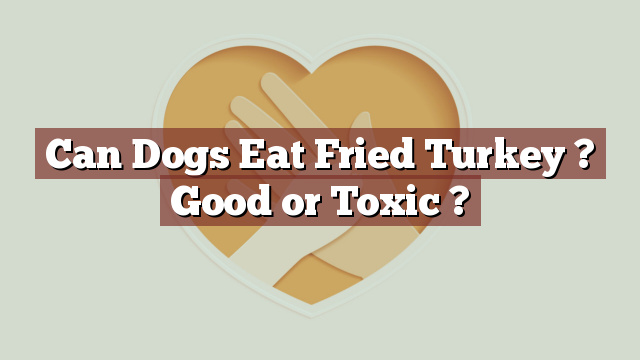Can Dogs Eat Fried Turkey? Good or Toxic?
Knowing what foods are safe for our dogs to eat is essential for their overall health and well-being. Many pet owners enjoy sharing table scraps with their furry friends, but it is important to be aware of which foods can be harmful to them. One popular food that often makes its way to our tables during the holiday season is fried turkey. But can dogs eat fried turkey? Let’s find out.
Nutritional Value of Fried Turkey
Fried turkey is a rich source of protein, which is beneficial for dogs. Protein is necessary for the growth, repair, and maintenance of their muscles and tissues. Additionally, fried turkey is also high in fat content, which can provide a concentrated source of energy for our canine companions.
Can Dogs Eat Fried Turkey? Safe or Toxic?
No, dogs should not eat fried turkey. While turkey itself is generally safe for dogs, the method of preparation, in this case, frying, can be problematic. The high fat content and the way it is cooked can pose several risks to our canine friends.
Fried turkey is often seasoned with various spices, such as garlic or onion powder, which can be toxic to dogs. These ingredients can cause gastrointestinal distress and even lead to more severe conditions like anemia. Moreover, the excessive amount of oil used in frying can upset a dog’s stomach, leading to vomiting, diarrhea, and pancreatitis.
Potential Risks or Benefits of Dogs Eating Fried Turkey
The risks associated with dogs eating fried turkey are significant. The high fat content can lead to weight gain and obesity, which can contribute to other health issues such as diabetes and joint problems. Additionally, the spices and seasonings used in fried turkey can cause digestive issues and even damage to a dog’s red blood cells.
On the other hand, the protein content of fried turkey can be beneficial to dogs. However, there are healthier and safer alternatives to provide protein for our four-legged friends, such as lean, unseasoned turkey meat.
What to Do If Your Dog Eats Fried Turkey
If your dog accidentally consumes fried turkey, it is important to monitor their behavior and health closely. If they exhibit any signs of gastrointestinal distress, such as vomiting, diarrhea, or loss of appetite, it is crucial to contact your veterinarian immediately. They will be able to provide guidance on how to manage any potential complications or suggest appropriate treatment.
Conclusion: Is Fried Turkey Safe for Dogs to Eat?
In conclusion, fried turkey is not safe for dogs to eat. While turkey on its own can be a healthy addition to their diet, the frying process and added seasonings can be harmful to our canine companions. It is always best to err on the side of caution and avoid feeding our dogs any fried or seasoned foods. If you want to share turkey with your dog, make sure it is lean, unseasoned, and cooked in a safe manner. Remember, your dog’s health should be your top priority, and consulting with a veterinarian is always a wise decision when in doubt about which foods are safe for them.
Thank you for investing your time in exploring [page_title] on Can-Eat.org. Our goal is to provide readers like you with thorough and reliable information about various dietary topics. Each article, including [page_title], stems from diligent research and a passion for understanding the nuances of our food choices. We believe that knowledge is a vital step towards making informed and healthy decisions. However, while "[page_title]" sheds light on its specific topic, it's crucial to remember that everyone's body reacts differently to foods and dietary changes. What might be beneficial for one person could have different effects on another. Before you consider integrating suggestions or insights from "[page_title]" into your diet, it's always wise to consult with a nutritionist or healthcare professional. Their specialized knowledge ensures that you're making choices best suited to your individual health needs. As you navigate [page_title], be mindful of potential allergies, intolerances, or unique dietary requirements you may have. No singular article can capture the vast diversity of human health, and individualized guidance is invaluable. The content provided in [page_title] serves as a general guide. It is not, by any means, a substitute for personalized medical or nutritional advice. Your health should always be the top priority, and professional guidance is the best path forward. In your journey towards a balanced and nutritious lifestyle, we hope that [page_title] serves as a helpful stepping stone. Remember, informed decisions lead to healthier outcomes. Thank you for trusting Can-Eat.org. Continue exploring, learning, and prioritizing your health. Cheers to a well-informed and healthier future!

